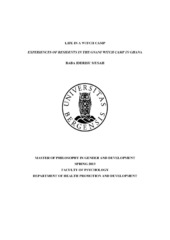| dc.description.abstract | One of the features of Ghanaian culture, which also form the worldviews of many Ghanaians, is the belief in and practice of witchcraft. Beliefs in and practices of witchcraft in Ghana cut across the geographical north as well as the geographical south. Thus, almost all the various ethnic groups in Ghana believe in and practice one form of witchcraft or another. The phenomenon is so entrenched to the extent that some communities have been classified as witch camps' in the northern region of Ghana. Reports of the number of camps are varied, but they are believed to be over six. At these communities, men and women, believed to have bewitched others, are kept under the leadership of a traditional authority. Even though the phenomenon has existed for many years or even centuries, it only attracted media and public attention in the recent past. This recent attention or focus has been based on the assumption, perception or even believe that alleged witches and wizards residing in these communities are living under bad conditions. There has also been the argument that the fundamental rights and freedoms of the residents of these camps are being abused. Using a qualitative research design, this study explores the experiences of the residents of one of the camps; the Gnani witch's camp. A total of fifteen residents of the camp, made up of thirteen women (alleged witches) and two men (alleged wizards) as well as six relevant actors constituted the informants for the study. Indepth interviews and observations were undertaken to collect data from these informants. Exploring, among other issues, the nature of people's movement to the camp as well as their social positions, this study revealed that contrary to public perception, the camp serves as a refuge for alleged witches and wizards and not a prison' or a sanctuary' as is the assumption in public cycles. Additionally, even though all the alleged witches and wizards reportedly noted that they were innocent of the accusations and were exorcised and cleansed, they nonetheless chose to remain in the camp instead of going back to their original communities. This thesis explores the various reasons for this, including the fear of being stigmatized, fear of fresh attacks and the unquestionable stance of traditional rulers or chiefs. | en_US |
